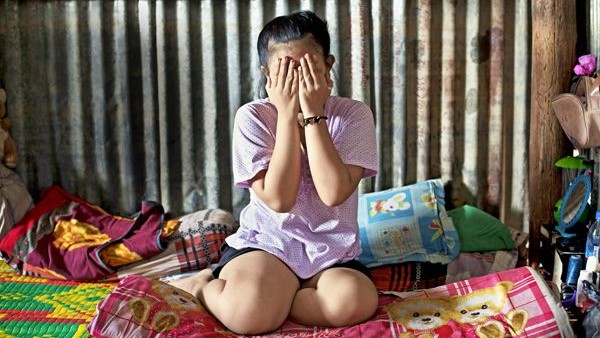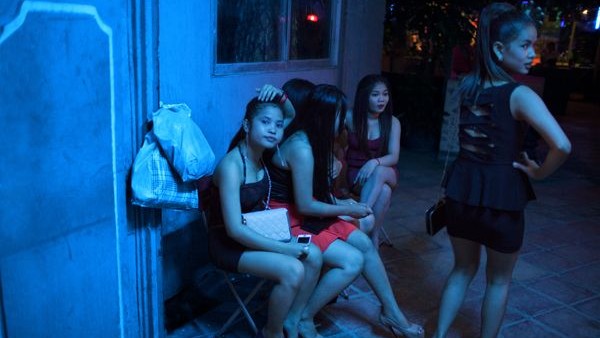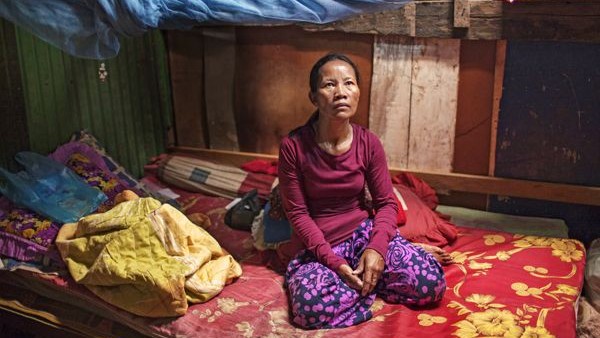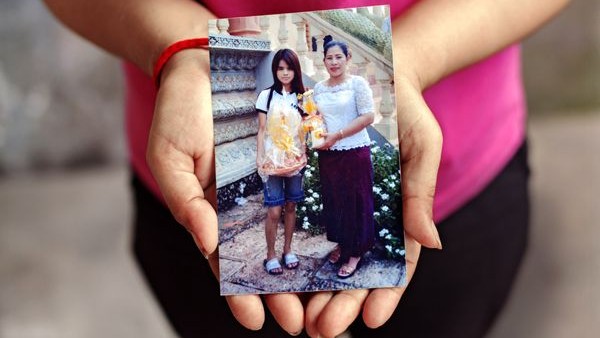My Mom Sold My Virginity
Inside Cambodia's highly secretive upmarket virgin trade.

Dara Keo and her mother, Rotana, were both in tears when it was time for her to leave. A motorized rickshaw had arrived to transport 12-year-old Keo from her one-room shack in Cambodia's capital, Phnom Penh, to an unknown location. Keo was crying because she was terrified. Rotana was crying because she knew she had done something unspeakable: She had sold her daughter's virginity to a rich, powerful man. The rickshaw driver took Keo to an underground medical clinic. A corrupt doctor on the payroll of brokers who arrange the sale of virgins examined her to check that her hymen was intact and gave her a blood test for HIV infection. "He confirmed I was a virgin and disease-free," says Keo, now 17. "Then I was taken to the man who bought me. I had to stay with him for one week while he raped me many times without a condom."
Cambodia's highly secretive upmarket virgin trade is a world apart from the capital's rowdy, neon-lit bars and karaoke clubs where foreign tourists and locals can buy sex for $10 or $20. Its clients are high-ranking officials from the Cambodian government, military, and police force, as well as other members of Asia's wealthy elite, who pay between $500 and $5,000 to sleep with a virgin.

Hostesses at Cambodian beer gardens are often targeted by men looking to purchase their virginity.'
Worldwide an estimated 4.5 million people are trafficked for sex or forced into prostitution, and 98 percent of the victims are women and girls, according to the International Labour Organization. In the United States, around 300,000 children are reported to be at risk of sexual exploitation. In Cambodia, an impoverished nation of only 15 million people, "many thousands" of Cambodian girls and women are sold for their virginity every year, says Dr. Chhiv Kek Pung, the president of Cambodia's leading human rights organization, Licadho. (There are no hard figures due to the trade's secrecy.)
The virgin trade thrives partly due to a cultural myth. "Many older Asian men believe sex with virgins gives them magical powers to stay young and prevent illness," she explains. "There is an endless number of destitute families for the trade to prey on, and the rule of law is very weak." Human trafficking, sexual exploitation, and the buying and selling of sex are illegal in Cambodia. However, because of official corruption and substandard police resources, no one has ever been convicted of purchasing virgins in Cambodia's courts.
'Worldwide an estimated 4.5 million people are trafficked for sex or forced into prostitution, 98 percent of whom are woman and girls.'
The belief that sex with virgins can prolong lifespan, originally from Taoist thought, has long been popular with Asian leaders. People's Republic of China founder Chairman Mao had a well-documented love of virgins. The North Korean regime allegedly keeps elite troops of virgins ages 14 to 20 known as "satisfaction teams," who are forced to provide sex to senior party officials.
Get exclusive access to fashion and beauty trends, hot-off-the-press celebrity news, and more.
In addition to rich locals, men from neighboring countries such as China, Singapore, and Vietnam are regular customers in Cambodia. "They travel here on business and have everything prearranged by brokers: a five-star hotel, a few rounds of golf, and a night or two with a virgin," says Eric Meldrum, a former police detective from the United Kingdom who now works as an anti-exploitation consultant in Phnom Penh. "The men know they can get away with it."
Home to more then 1,000 people, the Phnom Penh riverside slum where I meet Keo and her mother is a splintering jumble of wooden shacks alongside rancid water. Keo says that here, almost every teenage girl is sold for her virginity at some point. "Everyone knows, but nobody talks about it."
SHE HAD DONE SOMETHING UNSPEAKABLE: SHE HAD SOLD HER DAUGHTER's VIRGINITY TO A RICH, POWERFUL MAN.
Female chastity in Cambodia is enshrined in a code of obedience known as Chbab Srey ("Women's Law"), and the girls suffer unjust shame. "There's a national saying that men are like gold and women are like cloth," says Tong Soprach, who does independent research on Cambodia's youth for nongovernmental organizations (NGOs) and government bodies. "If you drop gold in the dirt, it washes clean and still shines. If you drop cloth, the stain never comes out." As a result, it is often hard for girls to marry or get regular jobs if they admit what happened to them.
Keo and Rotana tell their story inside the tiny room on stilts they rent for $10 a month. Outside, babies wail and hammers bang, and the walls shake as people traverse the slum's rickety pathways. Quiet-spoken Rotana, 62, says the decision to sell her daughter's virginity was a "last resort."
'Vannith Uy, 41, holds a photo of herself (right) and her daugther, Chamnan Sok. Uy sold her daughter\'s virginity when she was 18.'
Rotana married relatively late, in her 30s, and had six children. She was unable to marry earlier because romantic relationships and family life were banned under the bloody communist regime of the Khmer Rouge, during which an estimated 2 million people died in the 1970s. Three of her children died from fever, and she earned as little as $1 a day as a trash recycler to support the remaining three. (Keo is the youngest.) Her husband drank and played cards. "He died a few years ago, leaving gambling debts. His creditors threatened violence when I couldn't pay," Rotana says. A female neighbor working as a broker, or middlewoman, approached Rotana. "She said she felt sorry for me and promised me big money if I sold Keo's virginity." The virgin trade recruits local women to lure girls because they can befriend mothers easily. Often, they are former trafficking victims or sex workers themselves. "Fear and worry about the debts made me ill," Rotana says. "Finally, I gave in."
In a country where about a third of the population lives on less than $1 a day, the temptation to accept large lump sums for a daughter's virginity can prove irresistible. While rates vary, most families receive around $1,500, which is equivalent to four years' salary.
Keo is sitting on the floor dressed in mismatched floral pajamas. "When my mom told me she needed me to sleep with a strange man, I was very scared. We both wept for a long time," she says. Rotana was so desperate she accepted a fee of only $500 ($100 went to the broker). Keo says she "agreed" to be sold—although, as a 12-year-old, it's unlikely she had much choice or fully understood her fate. "I wanted to save my mother," Keo says.
She was taken to meet her buyer in a room in an exclusive hotel after her visit to the medical clinic. The man, wearing a dark suit and a gold watch, insisted on a doctor's certificate attesting that she was a genuine virgin. (Some brokers try to trick clients by surgically restoring a girl's hymen, so she can be sold multiple times.) "He ordered me to undress. Then he pinned me down on the bed, unzipped his pants, and forced himself into me," Keo says. "The pain was excruciating."
I ask about the man's identity. Keo and Rotana give me the name of a Cambodian politician who is still in office, but they refuse to reveal his name publicly. (To protect their safety, their names have also been changed as well as the names of other mothers and daughters mentioned in this story.)
Keo's ordeal went on for a week, a common length of time for men to keep each virgin they buy. The man forbade her to leave the room and visited her for sex two or three times a day. "He was very forceful," she says. "A few times he asked if he was hurting me. When I told him yes, he used even more force." She wasn't allowed to contact home. "When I was alone, I watched TV and cried myself to sleep." By the time she was freed, her vagina was torn and bruised. Her mother took her to a local doctor, who gave her painkillers and said her injuries would "heal on their own." Keo found it agonizing to walk or urinate for two weeks.


Sophleap Thai, 35, was sold to a brothel at age 18.'
If Keo feels anger towards her mother for selling her, it's buried deep. After recounting her story, she says nothing except that she feels "sad" about what happened to her. Rotana doesn't speak at all. Despite everything, Keo continues to support Rotana, who is now in poor health, by washing laundry for $20 per week.
Loyalty to parents is paramount in Cambodia. "The attitude is children exist for their parents' benefit, not the other way around," says Nget Thy, executive director of the Cambodian Center for the Protection of Children's Rights. "Children have a strong duty to pay back their parents for raising them. The concept of child rights is very weak."
While Thy believes poverty is the root cause of most parents' selling their daughters for sex, he says factors such as gambling and alcohol and drug abuse also play a role. "Playing cards for money or betting on soccer is very popular," he says. "Both men and women become addicted." And, because gambling is illegal for Cambodians, those who get caught often face the added expense of bribing police to escape criminal charges. With girls at risk of being sold by their own families, and without effective law enforcement or government intervention, the task of trying to help virgin trade victims is left mainly to nonprofit organizations working inside Cambodia.
THE TEMPTATION TO ACCEPT LARGE LUMP SUMS FOR A DAUGHTER'S VIRGINITY CAN PROVE IRRESISTIBLE.
Rattana Chey, 21, who lives close to Keo's slum, discovered her gambling-addicted mother was plotting to sell her virginity six years ago. Chey fled to Riverkids, a nongovernmental organization with an office in her riverside neighborhood. Founded in 2007 by a group of volunteers in Singapore, the NGO has four offices in Cambodia that provide refuge, schooling, and vocational training for children.
"Riverkids offered my family rice in exchange for not selling me," Chey explains. The rice was worth around $10 and helped feed the family of eight. They also gave her mother a microloan so she could set up her own food cart and sell bread to help break her gambling habit. "I have six siblings, and my father is a construction worker. He often has no work at all." Riverkids enrolled Chey in one of its programs to learn sewing. Thanks to the course, Chey now earns good money making clothes to help her family. Yet her mother still attempts periodically to sell her virginity, tempted by the huge sums of cash on offer. "A businessman from Singapore has offered $4,000 to sleep with me," she says. "My mother desperately wants me to agree." With the support of Riverkids, which has helped more than 900 vulnerable young people in Phnom Penh, Chey is able to resist her pressure.
Chesthavy Soun, a Cambodian senior social worker at Riverkids, says the organization works closely with families to change attitudes. "Some parents' thinking is very short-term," she says. "We try to show them that allowing their daughters to get an education and learn job skills is much more valuable." They also work to remove the stigma attached to girls whose virginity has already been sold. "We've had quite a few cases of girls becoming pregnant or needing treatment for STIs as a result of their ordeals. They are often shunned because they can't hide what's happened to them," Soun says. "We help them to get job training in things like hairdressing and computers so they can earn a regular income. This helps them to regain some respect in their communities."
Eradicating the virgin trade is slow and painstaking. Yet the process could be hastened if law enforcement made catching brokers and buyers a priority. But effective policing is blocked by silence and inaction at the very top of Cambodia's male elite. "The only people who can afford virgins are men in politics or in big business," says anti-exploitation expert Eric Meldrum. "These people have a very cozy relationship, so there is almost zero political will to tackle the problem."

'In their roles as beer garden hostesses, young woman sit with customers, engage in conversation, and pour drinks. Here, they line up onstage for patrons to choose.'
Because of the inaction, the U.S. State Department listed Cambodia on its 2013 Trafficking in Persons Report as a country failing to fully comply with minimum standards to eliminate trafficking, such as providing protection for victims and pursuing a zero-tolerance policy toward perpetrators. The report notes the "complicity of government officials [in Cambodia] contributed to a climate of impunity for trafficking offenders and a denial of justice to victims."
Vannith Uy, 41, who sold her own daughter's virginity, witnessed firsthand how men in power buy virgins without fear of repercussions. Three years ago, she was working in Phnom Penh as a cook in a beer garden—one of the many popular drinking spots that employ miniskirted young women to sell Cambodian alcohol and serve food. At night all over the city, crooning love songs leak into the darkness from the gardens. Behind their fairy-lit facades, they are prime hunting grounds for virgins. During her year there, Uy saw at least 50 young female employees sold for their virginity. She came to know prominent male buyers, including an aging politician from Cambodia's ruling party. "Everybody loved him because he gave big tips," she recalls.
Uy said the man went further than purchasing virgins for his immediate pleasure—he "reserved" younger girls age 8 or 9 for the future. "He asked mothers to bring their underage daughters to the beer garden after-hours. He chose the ones he liked and gave their mothers money every week to buy rice until the girls grew up." An arrangement was made for him to buy their virginity after they hit puberty, Uy explains.
A high-ranking police officer, speaking anonymously, confirms Uy's account. "There are more than one or two government officials who do this," says the officer, dressed in off-duty clothes in a coffee shop. The men are not afraid of being caught, he adds, because they know the police won't act. "If you try to enforce the law with these men, you will have a big problem," he says. "I have been threatened, and many of my colleagues working on this issue have had their jobs threatened." He says he's been warned by "people high up" not to pursue virgin-buying and rape cases because the crimes are "not serious" and "having sex is human nature."
Back in the slums of Phnom Penh, Riverkids is doing all it can to make up for such grave official shortcomings. Chey says she feels lucky she got help in time. But what makes her happiest is being able to save her two younger sisters, ages 8 and 15. Regular income as a seamstress makes Chey her family's breadwinner and gives her the biggest say in household affairs. "My mother wants to try to sell their virginity, but I will never let that happen," she says. "Thanks to my earning ability, I am the most powerful person in our family now. I am determined to break the pattern."
Follow Marie Claire on Facebook for the latest celeb news, beauty tips, fascinating reads, livestream video, and more.